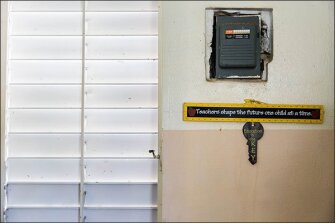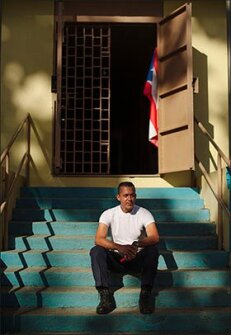San Juan, Puerto Rico
Five months since Hurricane Maria struck this U.S. territory and disrupted an already-struggling school system, different education leaders are speaking the same basic language: They want more and better educational opportunities for the island’s 320,000 public school students.
But there are big and potentially irreconcilable disagreements between those leaders about the best way to provide those opportunities. Some involve education policy arguments familiar to schools on the U.S. mainland. Other potentially difficult debates, however, deal with issues like the basic, day-to-day learning environment of Puerto Rico’s schools.

Just a week ago, Gov. Ricardo Rosselló released a plan that would create new “alianza” schools very similar to charters as part of broader education overhaul legislation. Puerto Rican law currently does not allow for charters. His proposal also includes a $1,500 annual teacher-pay raise, which would be the first in roughly a decade.
And a separate plan from Rosselló released late last month, with the backing of Secretary of Education Julia Keleher, would close more than 300 public schools, out of about 1,100, as part of an effort by Puerto Rico’s government to get a handle on its troubled finances. (That and other proposals must first be approved by other governing bodies on the island, including the Legislative Assembly.)
Keleher is also continuing her long-standing push to decentralize the Puerto Rico education department’s power and give local K-12 officials more authority, even as the prospect of choice and school closures grab headlines.
Complete Coverage: Putting Puerto Rico’s Schools Back on Track
“We’ve still got a long way to go, but we’ve come a good distance” since the hurricane, Keleher said in a recent interview here. “It’s been a real leadership challenge for me to try to set and manage expectations.”
Crumbling Classrooms and Power Outages: Inside Puerto Rico’s Storm-Damaged Schools
Such proposals to close current schools and open new, nontraditional ones are anathema to others in the education community, including the island’s teachers’ union, the Asociación de Maestros de Puerto Rico. Both the charter school and school-closure plans followed an extended tug of war over the speed at which schools were reopened in the wake of the hurricane.
Ready for a Fight
The school closure plan, which has Keleher’s backing, came out the same week as a Puerto Rico education department report that about 85 percent of teachers and students have returned to schools post-Maria, though those numbers vary significantly depending on the region. In Bayamón, for example, just outside of San Juan, only about two-thirds of teachers and students were reportedly back as of late last month. That means closures’ impact could vary widely if they were to occur.
On that and other issues, Keleher is moving fast, and she’s shown that she’s not afraid of causing conflict along the way.
She helped draft Rosselló’s education plan and says that it’s ultimately a balancing act: “I see it as a carefully constructed road map to manage not only the situation but our access to human resources.”

To underscore the need for such a reassessment of resources, she highlights the parents who text her complaining that their children lack teachers while other schools have a surplus of educators. Puerto Rico can’t afford to have schools where 95 percent of a school’s costs is going to salaries, she stressed.
At the same time, Keleher pointed out how she planned to secure $6,400 in funding per student, which she said was unprecedented. She has previously said that allocations fluctuated wildly, with some schools getting $7,000 per student and others just $2,000.
More big changes beyond charters are potentially coming down the road. “Vouchers [are] definitely going to be part of the reform. It’s not something we can execute immediately,” Keleher said, because of the island’s troubled budget books.
In her view, people who grew up in Puerto Rico and are now in their 50s got a good public education, but those who are now in the system deserve a better education, especially but not exclusively because of Hurricane Maria’s damage. And she has little patience for skeptics who she says lack their own data-driven alternatives to her ideas, including those who have protested school closures.
“I’m fully aware that there may be points in the journey that the adults are not happy with the decisions that I make,” said Keleher, who has been secretary for a little more than a year after previously working in Puerto Rico for the U.S. Department of Education. “I can’t have a situation where a student doesn’t have access to a teacher and there’s an excess of teachers in [another] location.”
Keleher added that if Puerto Rican parents’ demands to have better schools “provokes a corresponding conflict with a set of adults, then I am excited by that opportunity.”
Fears Growing
Keleher doesn’t lack critics, including in the leadership of the island’s teachers’ union.
Some educators are worried about whether they will have their jobs in a few months. The number of proposed school closures has caught them off guard. They worry that the close-and-revamp approach to many schools will lead to a downward spiral in which more teachers move to the U.S. mainland, leaving their former students and parents in the lurch.

In a message reacting to Rosselló’s proposal, the Federación de Maestros de Puerto Rico, an activist group of educators who have protested Keleher’s actions, said his administration “just declared war on the education of our children and the teachers by announcing the privatization of schools through the failed charter model.”
And to summarize their most fundamental fears, critics say the plans from Rosselló and Keleher amount to a push to privatize education at a time when better public schools, and more public schools, are needed.
“It’s like saying, ‘We are not going to give you the right to education,’ ” the Asociación de Maestros de Puerto Rico’s Toledo said.
Toledo, whose group is an American Federation of Teachers affiliate, expressed particular concern for students in rural, mountainous areas. If schools in those regions close, she argued, many students would have to travel 45 minutes to the nearest school—assuming that one doesn’t close. Many parents, she said, won’t accept that change and could leave the island.
Rumors and anxiety about what the department is up to are spreading.

In early February, teachers in Puerto Rico were sharing a list of soon-to-be-shuttered schools on social media, a list that Keleher’s department has said is false. The names of the 300 or so schools that would be closed under Rosselló’s plan are set to be released at the end of March, the secretary said.
Even the governor’s proposed raise for teachers doesn’t match what many teachers expect at this point. Toledo said teachers deserve pay increases so that their salaries rise to $3,000 a month on average. By contrast, Rosselló’s proposal would increase the average teacher salary to $2,325 monthly, or a $125 monthly increase from current pay levels. And that’s not the only material shortfall she said needs to be addressed.
“We don’t have books. We don’t have computers. We don’t have access to so many resources that the schools in the States have. That’s what upsets us,” Toledo said.
‘Lax Approach’
Some of the struggles deal with Hurricane Maria’s aftermath, not traditional hot-button policy issues.
Schools have so far received only temporary structural repairs, Keleher noted. And schools that need permanent fixes won’t get them this school year. She laments that she doesn’t have generators and solar panels to offer to all schools. As of late last month, about a third of the island’s schools were without power, and some only had it intermittently.
“I wish I had in hand generators and solar panels for each of the schools. I wish the timeline for school repairs wasn’t what it is,” Keleher said.
But the secretary also isn’t shy about criticizing what she calls a broad cultural problem in some schools: students who are at school but who don’t go to class and mill around in hallways or elsewhere.
“It was striking to me when I first saw it and it continues to be a concern. But it’s not solely a consequence of the hurricane,” Keleher said. “There’s a culture in some of the school buildings that allows for that sense of disconnectedness. There’s sort of a lax approach to managing the day and managing the time.”
Keleher’s background is also still the subject of discussion. Toledo raises, unprompted, the surprise some in Puerto Rico felt when Rosselló appointed Keleher as secretary over a year ago because she is from the mainland United States and is not a native Puerto Rican.
And ultimately, Toledo’s union is worried that Puerto Rican leaders want to “let the schools go down the hill” in order to replace them with the model of schooling they want that includes charters and vouchers, Toledo said.
Veteran educator Isabel Rodriguez Santos is of two minds.
Puerto Rico’s 2007 Teacher of the Year still teaches marketing and business administration at Dr. Maria Cadilla High School in Arecibo, about an hour west of San Juan, but she is in the middle of her own transition out of the classroom to oversee other educators. In early October, just a few weeks after the hurricane, she expressed hope that the island’s teachers would remain and help the schools recover.
Her school has power and internet access, and she is able to teach with the lights on. However, when she looks at other schools that are struggling and are clustered close together in some areas, she said she understands that changes may be inevitable.
“The schools are part of the community. So when you close a school, the people start to make some hard statements about the decision. But I understand that it is a difficult time,” she said. “The government has to make a difficult decision.





